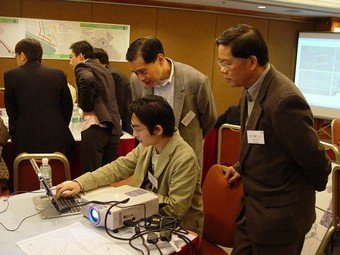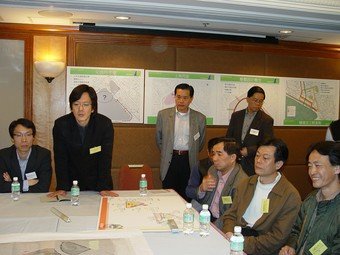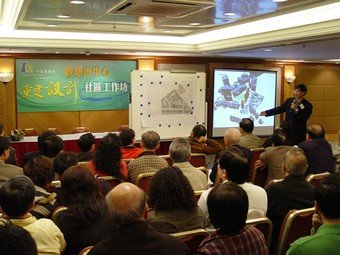


Locals join planning and design of Kwun Tong Town Centre redevelopment
Over 100 participants from the Kwun Tong community and other
sectors today (Saturday) articulated their aspirations and
innovations in a workshop on the future design of the Kwun Tong
Town Centre, the largest ever single redevelopment project
undertaken by the Urban Renewal Authority (URA).
The participants' task was facilitated by the use of a 3-D urban
design computer software which is the first time that such a
professional software is used for a community workshop of its kind
in Hong Kong. A team of architecture undergraduates was on hand to
assist the participants in generating instantly various planning
scenarios and layouts according to their views and suggestions.
Results of the workshop will be given to three architecture
consultant firms selected by the URA to produce comprehensive
development concepts which will then be used for further
consultation with the Kwun Tong community and other
stakeholders.
The workshop, organised by the Kwun Tong District Advisory
Committee (DAC) set up by the URA last November, is held to involve
local residents, civic leaders, businessmen, planners, architects
and social workers, etc. in the early stage of planning and design
for the 5.35-hectare town centre. The URA intends to submit a
formal planning application for this multi-billion-dollar project
to the Town Planning Board before the end of March 2007.
Mr. Edward Cheng, Chairman of the URA Board, described the design
workshop as an effective approach in "bottom-up" project planning
that enabled a wide segment of the local community to participate
hands-on in shaping an important part of their future habitat in an
innovative and yet realistic manner.
"Through this workshop, the URA will not only have a firm grasp of
the vision and aspirations of the local community but also
establish a much closer mutual understanding between all interested
parties and the Authority on the constraints and opportunities of
this mega project," Mr. Cheng said.
"This is not simply a URA project. In view of its scale and
complexity involving over 1,600 property interests, some 4,000
residents and need to maintain an unbroken service of public
facilities even during the redevelopment period, it is essential
that a close partnership be forged between the Authority and the
residents. We will try to come up with a development model to
reflect the ideas collected and put them in a coherent, integrated
and modern manner.
"We should not lose this good opportunity to come up with a 21st
Century design of world-class standard that can, apart from
creating a meeting hub, help to address environmental and transport
issues in East Kowloon," he said.
He emphasized that success of the project would depend on four
critical factors including public participation in the
comprehensive preparatory work on strategic positioning of the site
as a community hub of East Kowloon, planning and design
compatibility with government policies, acceptability of property
acquisition and rehousing arrangements, and phased implementation
to minimize disruption to people's livelihood.
"Of course, financial feasibility is a fundamental factor that
must not be overlooked if we want to make our dream a reality," he
added.
Professor David Lung, Chairman of the DAC who is also the Chairman
of the Planning, Development and Conservation Committee of the URA
Board, said the workshop provided an early opportunity for
participants to visualize various options of the initial
development design concept plans for the project with the aid of
professional 3-D computer software.
"With the aid of the 3-D graphic software, participants were able
to gain an instant 'feel' of the various development mix and
phasings they wanted to achieve.
"Furthermore, they were able to readily appreciate the practical
problems inherent in the urban design process, such as the hard
choice between building height, density and open space," he
said.
During the workshop, the participants divided themselves into six
work groups and each eventually came up with its own vision of the
development mix and phasing of implementation. Three consultancy
firms appointed for the initial design concept plans of the project
were on hand to present the broad parameters of their design
direction and listen to the views of the participants so that they
could input the views wherever practicable into their future
designs.
"We would consolidate views and suggestions from the workshop as
well as those we have collected earlier in our community aspiration
survey and produce three different detailed designs for further
public consultation in the coming months," Professor Lung
said.
The Kwun Tong Town Centre project is one of the 25 redevelopment
projects announced but not yet commenced by the URA's predecessor,
Land Development Corporation, in 1998.
(END)
